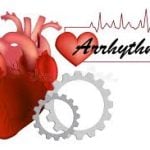
Arrhythmia is an irregular heartbeat or abnormal heartbeat rhythm. The heart may beat too fast (tachycardia) or too slow (bradycardia). It occurs if the heart skips a beat or has an extra beat. Arrhythmias are common among the normal population. Most arrhythmia are minor and not serious. However, they can be severe or life-threatening if you have other heart problems.
It is very important for you to learn how bad (severe) your symptoms are.
What are the types of Arrhythmia?
- Atrial fibrillation: if your heart beats irregularly and too fast, it is called atrial fibrillation. It can increase your risk of stroke.
- Paroxysmal atrial tachycardia: it means your heart has episodes of beating too fast. It is not severe.
- Ectopic beats: it is the condition when the heart has an extra beat. Seek treatment if you have several extra beats in a row and/or other heart problems.
- Ventricular tachycardia and ventricular fibrillation: It means your heart beats too fast. It requires immediate treatment.
Keep track of all the symptoms using myAnkr web portal or the Ankr app.
How bad is my arrhythmia?
Mild: Heart is skipping a beat or heart is beating too fast (palpitations). Most of the time, mild arrhythmia can be safely managed at home using the supportive care methods listed below.
Moderate: You may experience sweating, irregular heartbeats and fluttering in your chest. It can sometimes be safely managed at home or may require the attention of medical team. Moderate arrhythmia can get worse and need hospitalization with late, incomplete, or inappropriate treatment.
Severe: You may feel dizzy or light-headed, shortness of breath, fainting, and chest pain. It may be an emergency and sometimes require additional medical treatments or hospitalization. Seek immediate treatment if you experience above mentioned symptoms.
Keep track of your heartbeats using Ankr (myAnkr web portal or the Ankr app). It will help you describe the severity to your doctor or nurse.
Supportive care for Arrhythmia
- Limit alcohol use and stop smoking.
- Maintain a healthy weight through diet and exercise.
- Avoid or limit caffeine intakes, such as in coffee, tea, soda, and chocolate.
- Work with your doctor to manage heart disease or other health problems.
What tests are needed to diagnose Arrhythmia?
- Electrocardiogram (ECG or EKG): This is a non-invasive test that records the electrical activity of the heart. .
- Holter Monitor: ECG device records the heart’s activity over a 24-hour period or longer. It can help identify arrhythmias that may not occur during a short ECG test.
- Event Monitor: This portable ECG device is worn for several weeks or months. It can be activated by the patient when symptoms occur, allowing for the recording of the heart’s activity during an arrhythmia episode.
- Echocardiogram: It is an ultrasound test that uses sound waves to create images of the heart. It can detect structural abnormalities that may contribute to arrhythmias.
- Electrophysiology Study (EPS): This invasive test involves inserting catheters into the heart to stimulate and record its electrical activity.
- Blood Tests: Blood tests can help identify underlying medical conditions contributing to arrhythmia.
What caused my arrhythmia?
- Family history
- Certain types of cancer treatments (chemo drugs and targeted therapy drugs)
- Lifestyle habits (alcohol, smoking)
- Stress
- Obesity
- Lung disease
- Kidney disease
- Congenital heart disease (CHD)
- Abnormal heart valve function
- Heart failure
How can Ankr help with your Arrhythmia?
Don’t try to treat a arrhythmia by yourself. Use Ankr to:
(1) learn about the common symptoms of UTI
(2) send message to your Doctor if they use Ankr platform*
(3) be better informed about how to prevent another UTI